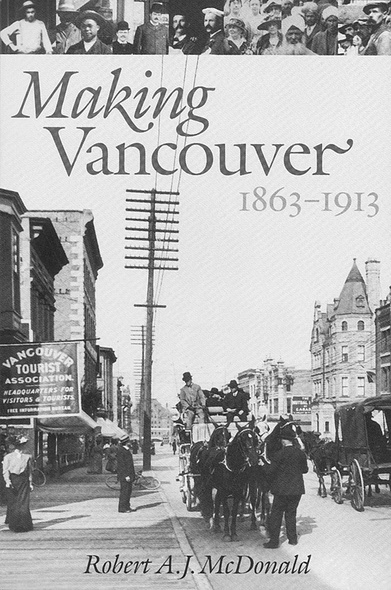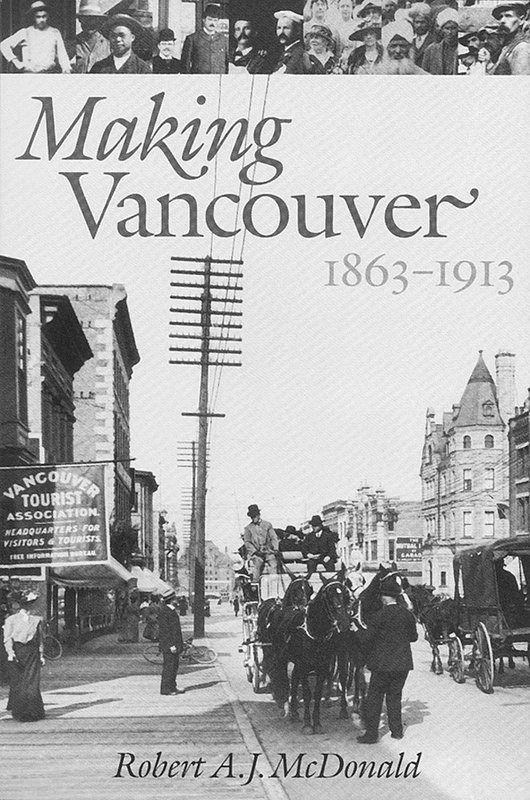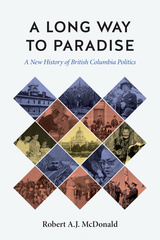
Making Vancouver explores social relationships in Vancouver from 1863 to 1913. It considers how urbanization structured social boundaries among Burrard Inlet's increasingly large population and is premised on the belief that, in studying social boundaries, historians must abandon single category forms of analysis and build into their research strategies the capacity to explore complexity. Robert McDonald thus traces the relationship between the two forms of identify, class and status, for the whole of Vancouver society.
The book starts with the years when settlement on Burrard Inlet centred around two lumber mills, explores periods of elite dominance of city institutions and then of growing social and political conflict following the arrival of the railway, examines the heightening of class tensions at the turn of the century, charts economic growth during the boom years before the war, and concludes with three chapters on the tripartite status hierarchy that emerged in concert with that of a class dichotomy. It reveals a western city that was neither egalitarian nor closed to opportunity. Vancouver up to the pre-war crash of 1913 was open and dynamic. The rapidity of growth, easy access to resources, narrow industrial base, and influence of ethnicity and race softened the thrust towards class division inherent in capitalism. Far more powerful in directing social relations was the quest for status, creating a social structure that was no less hierarchical than that predicted by class theory but much more fluid. The social boundary that separated the working class from others is revealed as a division that for much of the pre-war boom period divided Vancouver society more fundamentally than the boundary separating labour from capital.
Awards
- 1996, Winner - K.D. Srivastava Award, UBC Press
- 1996, Shortlisted - Vancouver Book Award, City of Vancouver
Making Vancouver is a solid piece of historical research and writing that asks and answers the fundamental questions necessary to understanding the social evolution of Vancouver ... his book will now serve as the standard against which to measure any serious history of Vancouver.
… well-focused and rewarding study ... historians concerned with a wide range of other issues in urban history will find his discussion of social structure useful ... his discussion of the CPR’s efforts to enhance the value of its property provides fascinating insights into the development of Vancouver’s urban form ... Provides an approach that can be applied profitably by historians working on the history of other urban centres in Canada (especially in the west), as well as by all concerned with the practical expression and meaning of social status and class in Canada.
Robert McDonald's Making Vancouver is a vibrant history of the early social and urban development of Canada's westernmost city ... An impressively comprehensive social history, McDonald's study fills a gap in the research and writing on Vancouver's history, making it a useful addition to the current literature ... The strength of Making Vancouver lies in the wealth of information developed through primary sources and in McDonald's analysis which renders such statistical data meaningful ... With a wealth of detailed accounts ... McDonald conveys the struggles and social upheavals which attended the making of Vancouver, and his rich documentation and carefully articulated arguments make for a riveting narrative which Canadian scholars will undoubtedly appreciate.
Maps and Photographs
Acknowledgments
Introduction
1 Crowded between Forest and Shore
2 City Builders
3 Monopolists and Plain People
4 Captial and Labour
5 Incorrigible Optimists
6 The Wealthy Business and Professional Class
7 The Artisan or Moderately Well-To-Do Class
8 The Immigrant Section
Conclusion
Notes
Select Bibliography
Index







